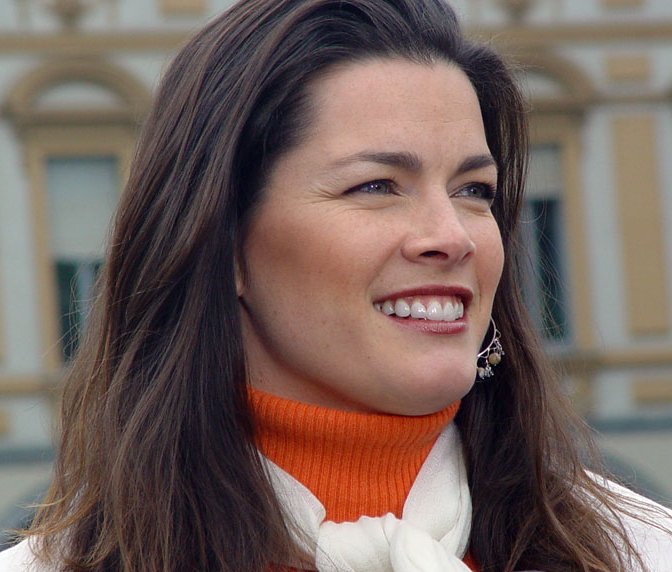
Nancy Kerrigan made headlines this week after bravely revealing that after marrying her husband Jerry Soloman in 1995 and welcoming their son Matthew in 1996, she experienced six miscarriages in eight years.
“Ever since I was ten years old, I’ve wanted to have three kids by the time I was 30, sort of like what my mom did,” the 47-year-old said on Monday night’s episode of Dancing With the Stars. Unfortunately, everything did not go as planned.
Kerrigan’s emotional response was heartbreaking; she used words like “failure” and “shameful” while recounting the miscarriages to describe the way she felt after each loss.
“The first time that you go in and they tell you, ‘Oh there’s no heartbeat,’ it’s devastating,” PEOPLE reports Kerrigan saying of suffering “at least” six miscarriages in the years after having Matthew. “I felt like a failure.”
Alexis Marie Chute, bereavement specialist and author of Expecting Sunshine: A Journey of Grief, Healing and Pregnancy After Loss, says it’s common for women to feel this way after a miscarriage.
“The loss of a baby is devastating on many levels,” Chute told Womanista. “There is the loss of the life and then the loss of the shared future. Because of this, women–and men–often feel robbed, cheated and helpless.”
“While they may feel the need to appear composed, often bereaved parents experience intense guilt that they could not protect their baby,” Chute continues. “Mothers, specifically, may feel shame that their bodies failed them–and their children–in the one task they should innately, biologically know how to do. To grow a healthy baby.”
However, Chute points out that those feelings of shame don’t come from a good place. “No one benefits from the blame game. The longer women, and their partners, cling to the ‘why’ questions, the longer they will stay stuck in grief.”
Chute says that instead of focusing on the “why questions” for too long, that parents work through their grief in creative ways like artmaking (e.g., painting, writing, sculpting, dance, etc.). In Kerrigan’s case, her dance on Monday night’s DWTS episode helped her work through her grief, even more than 10 years later. “We fought hard for this family, and I want to say to my kids through this dance, never give up. Keep trying. If you have hope in your heart, you can persevere,” Kerrigan said.
Not only did being open about her miscarriages help Kerrigan cope with her losses, but as a public figure, her experience is helping potentially thousands of other women cope with their own losses.
“When a bereaved mom or dad, and when people like Nancy, open-up about their experiences of loss, it helps chisel away at this taboo,” Chute says. “There is power in sharing stories that matter, stories at the heart of the experience of motherhood and family.”
Kerrigan’s doctors couldn’t pinpoint why she was having these miscarriages; as it turns out, there can be multiple causes of miscarriage.
Dr. Mark Surrey, the co-founder and medical director of the Southern Californian Reproductive Center, told Womanista that genetics, metabolism (read: thyroid problem), or even an immune deficiency could play a role in a miscarriage.
What’s more is that multiple miscarriages can lead to other miscarriages or even infertility, says Dr. Edward Marut, a reproductive endocrinologist with Fertility Centers of Illinois.
“Multiple miscarriages can lead to further miscarriages and even infertility if a D&C, also known as dilation and curettage, is done each time,” Marut told Womanista. “The D&C can cause scarring of the uterine cavity, which can prevent pregnancy or cause a miscarriage. Dilating the cervix may lead to a weakened or incompetent cervix, which can cause a late pregnancy loss or premature delivery.”
No matter the cause, any miscarriage can take its toll on a marriage–and Kerrigan and Soloman’s relationship is no different.
“It was devastating,” she said on Good Morning America. “It’s hard on your marriage.”
Chute says the divorce rate after a still birth or miscarriage is “still incredibly high” but there are ways for a couple’s relationship to grow stronger as a result of the tragedy.
“When partners consider that no one else has experienced their loss as intimately as they have, they can realize that their greatest source of sympathy and support is found in the other person. Communication is key,” Chute says. “Both individuals need to express their feelings without fear of judgement and seek to not only be kind and graceful with themselves, but their spouse as well.”
Making it even worse for Kerrigan and Soloman was having to tell son Matthew that he would have to wait to become an older brother.
“Once, the pregnancy was far enough along that we actually told our son and he was so excited,” Kerrigan told PEOPLE. “How do you explain [a miscarriage] to a little kid? Having to tell them that it was now gone and they had to take it out? He asked why and we had to explain, ‘Because it’s dead. It’s not alive anymore.’ That was awful.”
Eventually, Kerrigan and Soloman found success in IVF, and they welcomed another son Ryan in 2005, and a daughter Nicole in 2008. In addition to feeling love and joy when Matthew was born, Kerrigan said she remembered feeling relieved that he was OK.
“It almost felt shameful, I think, because I couldn’t do it on my own,” she told dance partner Artem Chigvintsev.
If, like Kerrigan, you do have a successful pregnancy and wind up holding your rainbow baby in your arms someday, it’s OK to feel happy, even after losing a child previously.
“This baby is not a replacement for the child that died, but a gift of hope and love after the storm of sorrow,” Chute says. “Parents should not feel guilty for their joy at giving birth to their next child. Their happiness is not a betrayal to their other baby. We humans are capable of experiencing many different emotions simultaneously. We can feel happy growing our family, while also still know the ache of longing for the deceased child.”
And as for Kerrigan’s “shameful” feelings for not being able to conceive naturally, Chute says those expectations come from “inappropriate expectations.”
“When we women feel we ‘should’ conceive naturally, or whatever other expectations are placed on us from family, friends, or society; it becomes nearly impossible to break through the noise to hear what our own inner voices have to say,” Chute says.
“At the end of the day, what we think about our decisions is all that matters,” Chute says. “If you want to have a child and have a variety of options available to you to make that happen, be empowered, and shut out all the other opinions. Families are made in all kinds of different ways.”
“To quote Nancy Kerrigan,” Chute says, “‘If you have hope in your heart, you can persevere.'”
